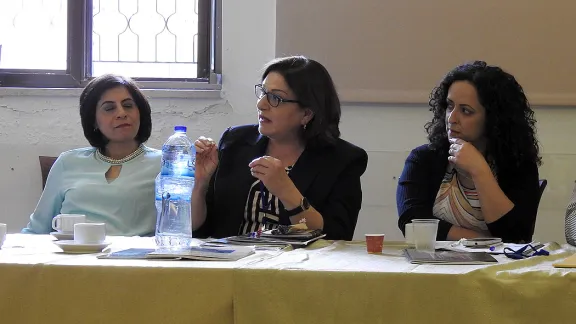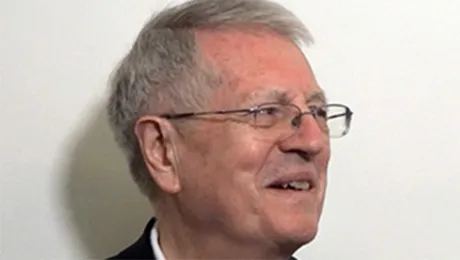
Workshop co-organizer Suad Younan, middle, encouraged the Holy Land church to use its prophetic voice and tools to challenge ecclesiastical and socio-political fixtures, during the launch of the gender justice policy in Arabic. Photo: LWF/E. Neuenfeldt
The Lutheran World Federation's gender justice policy has been translated into Arabic. LWF member, the Evangelical Lutheran Church in Jordan and the Holy Land, hosted a workshop that incorporated the launch of the Arabic version. The policy defines theological processes and practices that help to promote just relations between men and women, and enhance women’s contribution to both church and society.
Photos: LWF/E. Neuenfeldt and ELCJHL

The Evangelical Lutheran Church in Jordan and Holy Land held a seminar in Beit Jala, Bethlehem, to encourage all seven congregations to implement the LWF Gender Justice Policy. The 45 participants at the LWF-led seminar witnessed the launch of the policy in Arabic.

Addressing workshop participants, Palestinian lawyer Scarlett Bishara said it was necessary to "change not only the laws but also the cultural patriarchal attitude towards women.”

Suheir Farraj, a human rights and gender activist from the Muslim community, spoke about the advocacy of faith-based organizations on the subject of women's rights, as those rights are enshrined in global treaties.

Assistant professor at Bethlehem Bible College, Rev. Munther Isaac, leads theological discussion on the gender justice policy from a Palestinian context.

Rev. Sani Ibrahim Azar from the Redeemer congregation in Jerusalem talks about the ELCJHL Ecclesiastical Court constitution, which was revised last year to include equal recognition of men and women on family-related issues, including inheritance.

A discussion at the ELCJHL seminar that launched the LWF Gender Justice Policy in Arabic. Participants recommended further training to raise awareness about the rights of women and girls, implications for families in marriages of couples from different faiths, and strategies to include men in discussions on gender justice.

Participants in a session of the 6-10 May seminar that inaugurated the LWF Gender Justice in the Evangelical Lutheran Church in Jordan and the Holy Land.

Rev. Dr Elaine Neuenfeldt, LWF Women in Church and Society program, thanked the Holy Land church for translating the gender justice policy into Arabic, making it accessible in everyday language and theological perspectives that relate to the Palestinian context.

LWF President and ELCJHL Bishop Dr Munib A. Younan said the gathering of 45 participants had offered space for dialogue, training, and open sharing on gender justice in the Holy Land.


